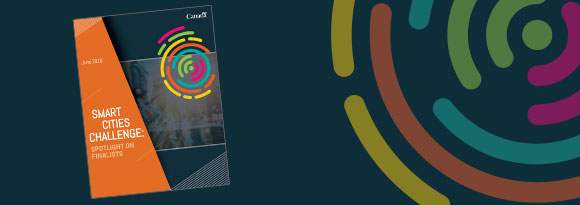Montréal, Quebec
This page has been archived on the Web
Information identified as archived is provided for reference, research or recordkeeping purposes. It is not subject to the Government of Canada Web Standards and has not been altered or updated since it was archived.
The first round of the Smart Cities Challenge is closed. The Government of Canada announced the four winners (City of Montréal, Québec; Nunavut Communities, Nunavut; City of Guelph and County of Wellington, Ontario; and Town of Bridgewater, Nova Scotia) on May 14, 2019.

Executive Summary
- PDF Version (243.26 KB)
- HTML Version
"Citizens most naturally identify themselves at the neighbourhood level when defining their reality. This is also the level at which they have the ability to change things."
– final proposal
"We want to make neighbourhoods more dynamic and inclusive, where mobility is a driver of social cohesion and collective action, and where vulnerable populations have better access to quality food."
– finalist video
- Watch the finalist's proposal video
- Read the finalist's full proposal (available in French only)
Challenge Statement
The Montreal community is shaping an efficient and dynamic neighbourhood life by innovating mobility and access to food. Through a co-creation and citizen participation process, the accessibility of services and the well-being of Montrealers are increasing significantly.
Summary
The city of Montréal and 36 project owners and partners are committed to take action on systemic issues of urban life including mobility and access to food so that all Montrealers may enjoy a pleasant quality of life where their basic needs are met.
Technology will allow us offer Montrealers efficient and sustainable transportation alternatives, thus reducing automobile usage. As a result, neighbourhoods will become more enjoyable places, conducive to a rich and local way of life.
An improved public transportation offering associated with new and innovative forms of mobility (car sharing on-demand, autonomous vehicles, bike sharing, etc.) will reinforce the access to local services, most notably to food supply.
As a complement to the technological dimension, transversal projects in governance and citizen engagement will ensure the responsible deployment of technologies, given that they will be derived from collective decision-making, thus preventing abuse in terms of data collection and usage.
The combination of a participative and technological approach framed by innovative and agile governance will not only concretely improve the lives of Montrealers, but will bring about profound, sustainable change which may be applied to other contexts.

Spotlight on Finalists:
Montréal, Quebec
Population: 1,704,694
Focus Areas:


Prize Category:

#smartcitiesCanada
The Jury's Perspective
Read the transcript
My name is Matthew Claudel. I am a researcher at MIT. I am involved with DesignX: a new lab for urban innovation and design innovation. And there, I am the head of civic innovation.
What I see in the "Smart City Challenge" is the beginning of a deep social transformation that's going to underpin civic innovation in Canada, and potentially civic innovation around the world. The Canadian government has really come forward and said that this is a priority and I'm excited to see what emerges from the bottom up; and what sorts of technologies, and what sorts of solutions, and community-based actions emerge from that bold statement.
La vie de Montréal propose la création d'une ville quartier efficiente et dynamique. La stratégie elle-même est innovante. L'équipe montréalaise a fait un appel à projets et des journées de co-création pour découvrir et catalyser l'écosystème d'innovations à Montréal. L'application souligne les enjeux de mobilité et alimentation de proximité. Et, au final, la ville s'engage à modifier l'administration municipale pour la rendre plus innovante. Je suis passionné de voir les idées que Montréal a présentées.
The Finalist's Perspective
Read the transcript
The smart cities challenge is a competition that called in Canadian communities to explore how data and connected technology can achieve meaningful outcomes for residence.
On screen:
Smart Cities Challenge
Winning communities
School
The finalists
$50M category: Montréal, Quebec
Tell us about your team and your community
Stéphane Guidoin (Director, Montreal Urban Innovation Lab): The Montreal Urban Innovation Lab is leading the Smart Cities Challenge for the City of Montréal. It's a a team of 10 people who were fully mobilized for the Smart Cities Challenge. In terms of the commitment were seeking, we were going to look for nearly 200 partners in the initial phase. We reached about 30 partners who are working with us to carry out and complete the challenge, but this is obviously based on information we collected through surveys and discussions in the community. So we really tried to mobilize the entire Montreal community to really develop this proposal.
On screen: Why did you enter the challenge?
Stéphane Guidoin (Director, Montreal Urban Innovation Lab): We decided to participate in the challenge because it was a good opportunity to mobilize. Of course, we wouldn't say no to receiving $50 million in the end. But it is really the time to seek, to give ourselves a challenge, give ourselves a goal to meet and really use this to mobilize the whole community. Many stakeholders regularly told us that they wanted to do projects with the city and find subjects and the means to do it: this was the perfect opportunity to do so.
On screen: Challenge statement: The Montreal community is shaping an efficient and dynamic neighbourhood life by innovating mobility and access to food. Through a co-creation and citizen participation process, the accessibility of services and the well-being of Montrealers are increasing significantly.
Join the conversation: #smartcitiesChallenge
Infrastructure Canada
- Date modified: